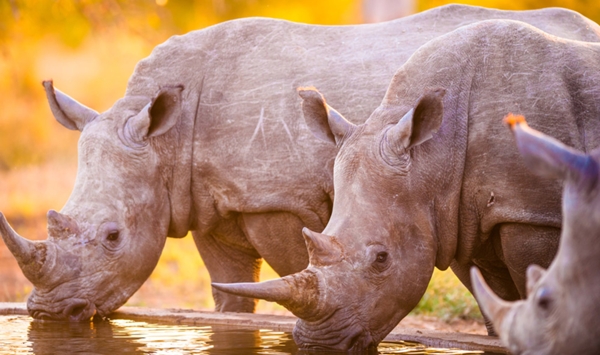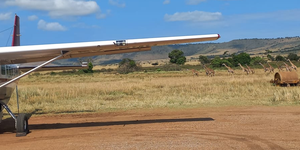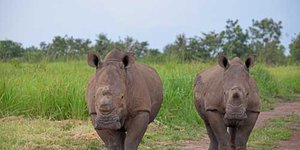Like this article?
Go on, give it a kudu!

Published on May 15 2013
Written by:
Fran
623 views
Giant and majestic. Watching a rhino running free is an impressive sight, and hopefully you’ve watched from the safety of your safari vehicle. Belonging to Africa’s big five, the average adult rhino is large and sturdy, a dangerous animal and their horns can cause lethal damage. But sadly, these strong animals are succumbing to the cruelty of this world. Rhino horn is reaching extremely high prices on illegal markets, some say the prices are as high as the street value of cocaine. These super high prices for rhino horn are sending the poachers right back to rhino territory. In the recent years, southern Africa has seen poachers making more and more use of technology, air traffic and specialized weapons for their brutal acts.
Two rhino species, the black and white rhino, are native to Africa. Found in countries such as Tanzania, Kenya, Angola, Zimbabwe, Namibia and South Africa, rhino populations have been under threat due to poaching for many decades. Partly due to poaching and ill conservation throughout Africa, 70% of the total African rhino population is today found within South Africa. And sadly, South Africa is now the main target for rhino poachers. In 2012, poachers brutality killed a total of 668 rhinos in South Africa and the outlook for 2013 is not looking all the much better. What is worrying is that the majority of last year’s illegal rhino killings took place within the borders of the Kruger National Park – where one would expect conservation and anti-poaching systems to fight the onset and protect the animals. But the vast extent of the Kruger National Park, and the professional operation of poachers are proving difficult to fight. The truth is that poachers are much more hardened than in previous decades, operating with military precision. They come with meaning and they do not leave before they have what they came for – rhino horn. A loss of well over 400 rhinos for the Kruger National Park per year is a conservation tragedy. Merely a decade ago, rhino poaching was basically under control with yearly mortalities totaling between 10 and 20. One decade later with mortality ratings close to 700 rhinos per year, many fear that the battle is being lost.
This situation comes as a major blow for many southern African conservationists whom have dedicated their lives to securing the rhino population numbers. The conservation status of the African rhino confirms the desperate situation. In terms of the International Union of Nature Conservation (IUCN) listings, the white rhino is classified as Near Threatened and the black rhino as Critically Endangered. Future predictions tell us that should the current rate of rhino killings persist, the rhino could be extinct in Africa as soon as 2025.
South Africans are outraged by the brutality with which our rhino populations is being slained, and the fear of losing the rhino forever is on everyone’s mind. But how do you fight a soaring economy based on a traditional myth? The price of rhino horn powder is reaching new record prices across Asia, particularly south and east Asia, as the traditional belief that rhino horn bears medicinal power is strengthened - with the heart-breaking result of a steadily declining and fragile rhino population. No rhino is safe from poachers and keeping them safe and secure is a very difficult and dangerous task for game owners and national park authorities. There is however some good news: late 2012, the United States Intelligence Community assigned a formal security threat status to rhino poaching. The increased severity and brutality of rhino poaching coupled with international connections, are raising the battles to war level. And with the US Intelligence on board, a global action against rhino poaching is mobilizing.
Another important strategy in working towards combatting rhino killings, is educating the end-product user. It is a huge frustration to think that the extinction of such an impressive animal could lie at the hands of a traditional medicinal myth.
The South African government, with the help of international governments and organizations, are recognizing the critical status of rhino poaching. But the public’s help is needed – do your bit by keeping up to date with information on the fight against poachers and support anti-poaching organizations where possible. If the rhino is swept of the African soil due to the hands of humans will be a terrible tragedy.
Has been on: 11 safaris
Seeing beyond the average tourist routes and experiencing local life is my type of travel! Living in South Africa I'm an environmentalist at heart, and I continue to marvel at the beauty of the African continent.
© Your African Safari Ltd, All rights reserved.
Your African Safari is a safari-planning and safari review site. It was created to help support a healthy African wildlife population. All reviews are vetted before being approved and only ethical tours are published

Using charter flights on your next safari
Published on December 22 2025
By: yourafricansafari.com

Garamba National Park—an anchor of hope in the Democratic Republic of Congo
Published on January 09 2025
By: R.W.

Namibia imposes new visa requirements
Published on July 25 2024
By: yourafricansafari.com